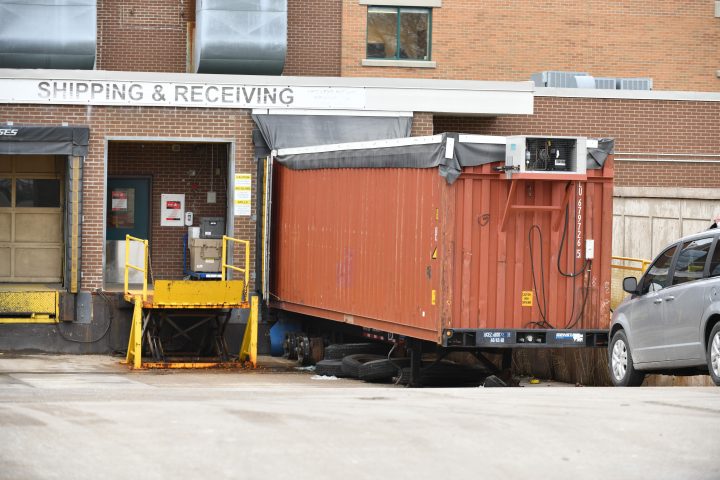A southwestern Ontario hospital has been forced to store bodies in a trailer unit amid a surge in deaths due to COVID-19.

It’s the second hospital to do so in recent weeks as the province’s health-care system strains under a growing number of seriously ill patients.
Windsor Regional Hospital has been storing as many as five bodies in a trailer for the last two weeks after its morgue reached capacity, its CEO said Wednesday.
The temporary unit, attached to one of the hospital buildings, was built in April due to limited permanent morgue space.
Plans were put in place a year ago to deal with the possibility of high casualties during a pandemic, and hospital CEO David Musyj said after weeks of rising infections, hospitalizations and deaths in the community from the virus, the need for the space has arisen.
“I know it’s morbid, and it’s difficult, but it’s reality,” Musyj said in an interview Wednesday.
The temporary morgue unit was used during the first wave of infections but now the region is dealing with higher-than ever hospitalizations, with the trend predicted to continue as daily infections remain high.

Get weekly health news
There are more than 70 people in the hospital’s intensive care unit and this week some acute care patients will be transferred to other regional hospitals due to lack of space.
Musyj said local funeral homes are being also strained by a “substantial” number of deaths in Windsor-Essex County over the last few weeks due to COVID-19 and other causes.
The local public health reported 17 daily deaths from COVID-19 on Wednesday, the highest daily count in the region so far.
The hospital also has an agreement in place to use a city-owned arena if the 36 spaces in the temporary, on-site morgue fill up — a scenario Musyj said would be “a tragedy and of itself,” but one it needs to prepare for with 24 spaces available in its permanent morgue facility.
“Hopefully we never have to use the hockey rink,” he said. “But our strategy always is, you plan for the worst, pray for the best and be ready for everything in between.”
A London, Ont., hospital is also temporarily storing bodies in a mobile unit after reaching capacity at its morgue.
The London Health Sciences Centre said new protocols during the pandemic have slowed down the process for moving bodies, so it’s brought in a mobile unit this week to temporarily deal with the capacity issue.
Scott MacCoubrey, president of the Ontario Funeral Service Association, said news of bodies stored in refrigerated units is disturbing, though he said the problem appears localized to the southwestern region.
“All funeral directors are only concerned of the dignity of the person who has died and the families that we serve, so it is deeply disturbing,” MacCoubrey said in an interview.
MacCoubrey said funeral homes and crematoriums are working long hours to keep up with demand in Windsor and London.
But he said the pandemic slows down the work that goes into planning a funeral, with meetings moving online and social distancing measures in place.
Social workers now working from home also slows down the process when identifying bodies in morgues, he said, as well as hospitals working as quickly as possible to open intensive care beds.
“All that sort of adds up to clogging up the system,” MacCoubrey said.












Comments
Want to discuss? Please read our Commenting Policy first.